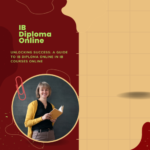Navigating Success: Strategies for Excelling in Your IB Math Exam
Preparing for your International Baccalaureate (IB) Math exam requires strategic planning, dedication, and a clear understanding of the curriculum. As one of the most challenging subjects, IB Math demands a comprehensive approach to study effectively and perform well on the exam. In this article, we’ll explore a variety of strategies to help you navigate your ib math exam 2023 and set the stage for success.
1. Master the Syllabus: Understanding the IB Math syllabus is the foundation of your preparation. Familiarize yourself with the topics covered, including core content and optional topics if you are pursuing Higher Level (HL) Math. The syllabus serves as a roadmap, guiding your study plan and ensuring you cover all essential concepts.
2. Create a Detailed Study Plan: Develop a well-structured study plan that covers the entire syllabus. Break down your study sessions into manageable sections, allocating time for each topic based on its complexity and your familiarity with it. Be realistic in your planning and set achievable goals to maintain motivation.
3. Practice Regularly: Mathematics is a subject that improves with consistent practice. Allocate time for daily or weekly practice sessions to reinforce your understanding of key concepts. Focus on solving a variety of problems, ranging from basic to complex, to hone your problem-solving skills.
4. Utilize Past Papers: Past papers are invaluable resources for exam preparation. Practice with previous years’ IB Math exam papers to familiarize yourself with the format, question types, and level of difficulty. This will help you develop effective exam strategies and identify areas where you may need additional practice.
5. Seek Help When Needed: If you encounter challenging concepts or problems, don’t hesitate to seek help. Your teacher, classmates, or online resources can provide alternative explanations and solutions. Understanding difficult topics early on will prevent them from becoming major obstacles later in your preparation.
6. Embrace Technology: Leverage technology to enhance your learning experience. Interactive websites, educational apps, and online tutorials can provide visual aids, simulations, and additional practice problems. Tools like graphing calculators and mathematical software can also aid in visualizing and solving complex problems.
7. Collaborate with Peers: Studying with classmates can be beneficial. Form study groups to discuss and solve problems collaboratively. Explaining concepts to others reinforces your own understanding, and your peers may offer different perspectives that deepen your insight.
8. Understand Mathematical Concepts: Instead of rote memorization, focus on understanding the underlying principles of mathematical concepts. This approach not only aids in problem-solving but also equips you with the flexibility to tackle a variety of questions on the exam.
9. Memorize Formulas and Definitions: While understanding concepts is crucial, memorizing key formulas and definitions is equally important. Create flashcards or a formula sheet to help reinforce your memory. Regularly review these materials to ensure you can recall them quickly during the exam.
10. Organize Your Notes: Keep your study materials well-organized. Maintain a comprehensive set of notes that condense key concepts, formulas, and problem-solving techniques. Having a structured resource to refer to during your revision will save you time and reduce stress.
11. Focus on Time Management: Effective time management is essential during the ib math aa. Practice solving problems under timed conditions to improve your speed and efficiency. Allocate specific time limits to different sections of the exam to ensure you can address all questions within the given timeframe.
12. Review Mistakes: When practicing, pay close attention to mistakes. Analyze why you made an error and understand the correct solution. Learning from mistakes is a powerful way to enhance your understanding and prevent similar errors in the future.
13. Prioritize Weak Areas: Identify your weak areas and prioritize them in your study plan. Dedicate additional time and effort to concepts or types of problems that you find challenging. Strengthening these areas will contribute significantly to your overall performance.
14. Simulate Exam Conditions: In the weeks leading up to the exam, simulate exam conditions as closely as possible. Set aside specific times for practice exams, complete with timed sections and strict adherence to exam rules. This helps acclimate you to the exam environment and reduces anxiety on the actual test day.
15. Stay Physically and Mentally Healthy: Maintaining your physical and mental well-being is essential during the exam preparation period. Get enough sleep, eat a balanced diet, and engage in activities that help you relax. A healthy body and mind contribute to better focus and concentration.
16. Review the Internal Assessment (IA): If your ib math syllabus 2023
includes an Internal Assessment, allocate sufficient time to review and revise it. The IA is a significant component of your overall grade, and a well-prepared assessment can positively impact your final results.
17. Stay Updated with Curriculum Changes: The IB curriculum may undergo occasional updates. Stay informed about any changes to the syllabus or exam format. Consult with your teacher or check official IB resources to ensure your preparation aligns with the most current requirements.
18. Manage Exam Stress: Exam stress is natural, but effective stress management is crucial. Practice relaxation techniques such as deep breathing, mindfulness, or meditation to stay calm during the exam. Trust in your preparation and focus on each question as it comes.
19. Review Exemplars and Mark Schemes: Examine exemplars and mark schemes provided by the IB. This will give you a clear understanding of the expectations for each question and the criteria used for assessment. Align your responses with these standards to maximize your scoring potential.
20. Reflect and Adapt: Regularly reflect on your study methods and adapt them based on your progress. If a particular strategy is not yielding the desired results, be open to adjusting your approach. Flexibility in your study plan ensures that you can address challenges effectively.
In conclusion, excelling in your
ib math courses requires a multifaceted approach that combines thorough understanding, consistent practice, and effective exam strategies. By following these tips, you can navigate the complexities of IB Math with confidence. Remember that success in math is not just about finding the right answers; it’s about developing a deep understanding of the subject and applying your knowledge in diverse problem-solving scenarios. With dedication and a well-structured study plan, you can approach your IB Math exam with the skills and confidence needed to achieve your academic goals. Good luck!



